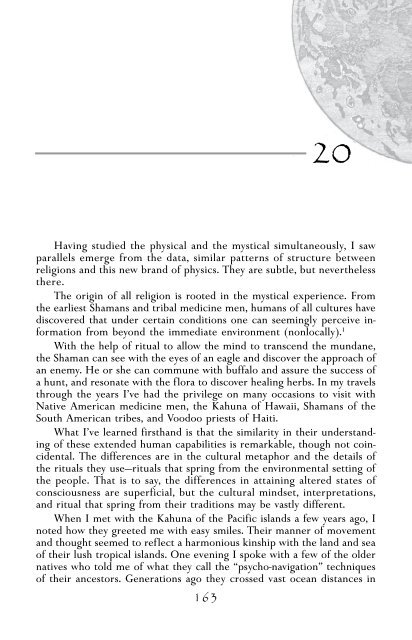edgar-mitchell
edgar-mitchell
edgar-mitchell
Create successful ePaper yourself
Turn your PDF publications into a flip-book with our unique Google optimized e-Paper software.
82<br />
The Way of the Explorer<br />
explanation. I knew there was something worthy of serious investigation if<br />
the issue was approached in a manner different from the traditional. I<br />
wanted to become intimate with the nature behind the phenomenon of<br />
human mental functioning—not neurophysiology necessarily, but rather<br />
the overall system that permitted us to evolve as we have. The question of<br />
how thought evolved seemed a more basic question than even how life<br />
itself evolved, though scientific tradition suggested otherwise. The reason<br />
for my brash certainty was simply founded: If the phenomenon of<br />
psychokinesis, as reported in the world’s religious and mystical literature,<br />
had any validity at all, then the scientific doctrine called epiphenomenalism<br />
was a flawed concept.<br />
Epiphenomenalism is the understanding that consciousness is merely a<br />
byproduct of physiological process; that it is secondary. Consciousness has<br />
no power to influence physiological processes, because it is the result of<br />
the evolution of our corporeal bodies. Epiphenomenalism is also mainstream<br />
scientific dogma. By this way of thinking, the mind cannot assume<br />
control over the machine, or the physical universe, though my experience<br />
on the way home from the moon seemed to suggest otherwise. There had<br />
to be some relationship between the intuitive experience of epiphany and<br />
the curious results obtained from the various phenomena being studied in<br />
parapsychology. Spread out before me was the vast internal landscape of a<br />
largely unexplored world.<br />
The term epiphany, in the connotation of an intuitive insight, is certainly<br />
descriptive of what I experienced, as is the Greek word metanoia,<br />
which implies a change in thinking, even a new direction. But neither<br />
word individually, nor together, adequately describes the event itself. They<br />
seemed to surround the meaning without actually touching it. But there<br />
were other questions on my mind as well. I wanted to know what caused it<br />
to happen in the first place, what its place was in the vast scheme of things.<br />
Of course I wanted to know if others had similar experiences.<br />
The latter question would take a decade to answer, and even then it<br />
would be answered rather indirectly. Engineers and test pilots have never<br />
been noted for introspection and spontaneous eloquent expression, so a<br />
direct approach would have been fruitless even had I known the right<br />
questions to ask. But it’s significant that many of the men pioneering spaceflight<br />
began to express openly a more subtle side to their personalities<br />
after returning home. Several astronauts, notably Jim Irwin and Charlie<br />
Duke, immersed themselves in their religious callings; Alan Bean and Alexii<br />
Lenov, a cosmonaut, both found expression through art. Rusty Schweickhart<br />
spent a major portion of his subsequent career pursuing environmental<br />
concerns, often speaking eloquently on subjects closely related to my own<br />
interests. Al Worden published a book of poetry. I’ve found it interesting<br />
that all these Americans, with the exception of Worden, were lunar module<br />
pilots, which gave them a bit more latitude for contemplation on their


